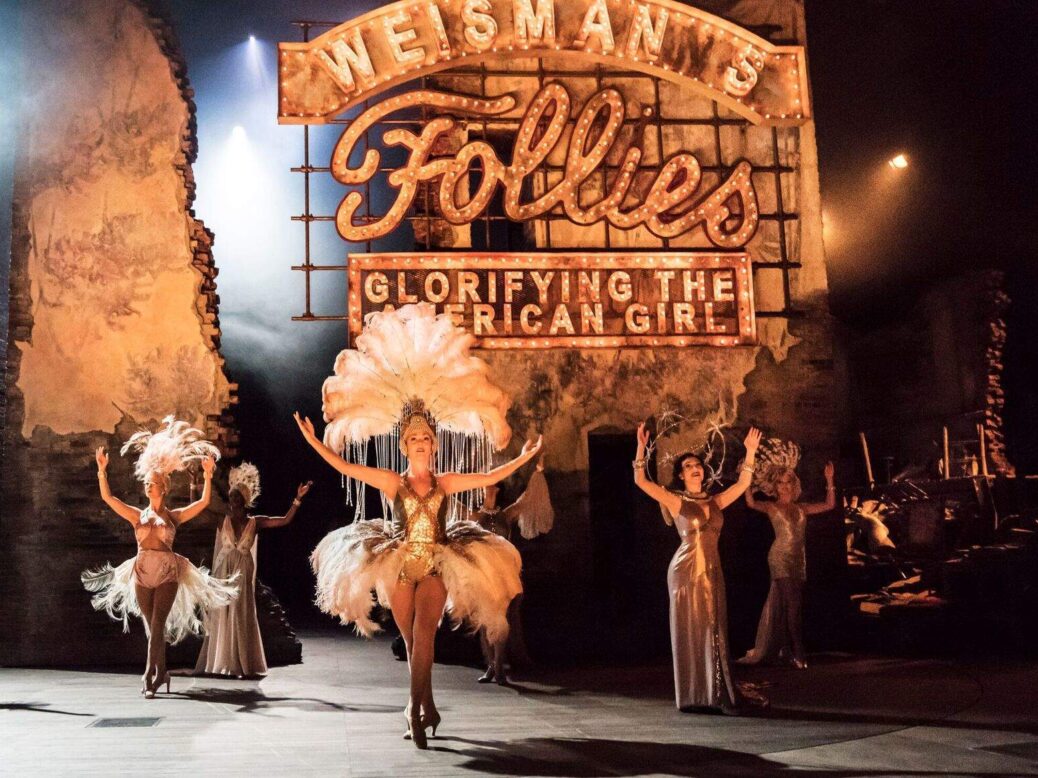
Since its 1971 Broadway premiere, which won seven Tony awards but lost a lot of money, Follies has continued to have the paradoxical status of an obviously great musical that stumbles in production. Successive revivals – including the West End in 1987 and Broadway in 2011 – divided critics and audiences, the only unity coming from production accountants blinking at the red ink.
The show’s slipperiness is apparent from the fact that no two major revivals have used exactly the same Stephen Sondheim music and lyrics, or James Goldman dialogue: Dominic Cooke’s National Theatre production has custom-built yet another version from the vaults of scores and scripts. If Sondheim is the Shakespeare of musical theatre, Follies is his “problem play”, a Measure for Measure or All’s Well That Ends Well. As in those cases, the difficulty lies in reconciling starkly divergent tones.
Set at a 30-years-on reunion of vaudeville singers and dancers from a New York theatre that closed in 1941, the show moves between the time periods. Sondheim alternates sharp-eared pastiches of their former acts – tap-dance duets about kissing in the rain, cod-accented tributes to the lovers’ city of “Paree” – with fiercely realistic accounts of infidelity, depression, and alcoholism among the main characters: Sally, who is married to Buddy, has come to the bash in the hope of finally igniting old flame, Ben, to leave Phyllis, the showgirl he chose over her.
If the interleaving of these burlesque and tragic songbooks were not already ambitious enough, the finale goes simultaneously for joke and broke. In a nightmare version of one of their old shows, each of the central quartet has a solo that, through some style of crooning or hoofing, exposes their soul: Imelda Staunton’s Sally performs “Losing My Mind”, a clinically precise account of a suicidal nervous breakdown in the form of a torch song, while Philip Quast’s Ben, in “Live, Laugh, Love”, has a tap-dance crack-up that goes from white tie and tails to white coats in a few notes.
The key to a production that surely finally solves the musical’s problems is Cooke’s constant blurring and merging of the two worlds: the junior 1930s versions of the characters stalk and haunt their seniors in the Nixon era, the young as horrified by the prophecies of their futures as the old are tormented by memory. The revelation of this staging is that Follies forms, with A Little Night Music (1973) and Merrily We Roll Along (1981), a Sondheim trilogy about the accusing ghosts that lie in wait on both the roads we take, and those we don’t.
This unsettling sense of past and present judging each other is helped by the fact that Staunton, completing a remarkable 2017 double in American roles after her powerhouse turn in Albee’s Who’s Afraid of Virginia Woolf?, can uncannily become the younger Sally during a smiling or grimacing reminiscence. Staunton is already celebrated for her ability to play the full theatrical range – farce, darkness, song, dance – but Janie Dee also gloriously hits all four as Phyllis, required to twist legs and tongue to their limit in “The Story of Jessie and Lucy”, a fable about two women who envy each other, with lyrics that are somersault-supple, even by Sondheim standards: “Lucy wants to be dressy / Jessie wants to be juicy / Lucy wants to be Jessie / And Jessie Lucy.”
Two years into the artistic directorship of Rufus Norris at the National, there are regular columns and blogs citing prominent flops (Salomé, Common) as evidence of a crisis. It’s true that Norris’s tenure has veered between must-see and don’t-look, but the best has been exceptional, with smart new plays by women (Nina Raine’s Consent, Lucy Kirkwood’s Mosquitoes) and dazzling revivals of modern American repertoire: Stephen Adly Guirgis’s The Motherfucker with the Hat, August Wilson’s Ma Rainey’s Black Bottom, Annie Baker’s The Flick, Tony Kushner’s Angels in America (just announced to transfer to Broadway next year), and now this astonishing Follies.
Purists might object that Norris risks running a National Theatre of America rather than of Great Britain, but it would be ridiculous to complain on any grounds about work of this intelligence and quality. Those struggling with tickets or travel for London should make a date at their nearest cinema signed up to the NT Live scheme, which will screen Follies on November 16.
“Follies” runs until 3 January 2018






